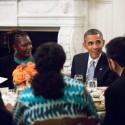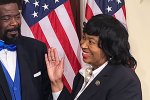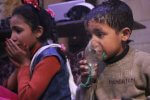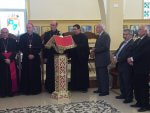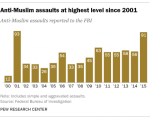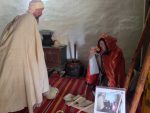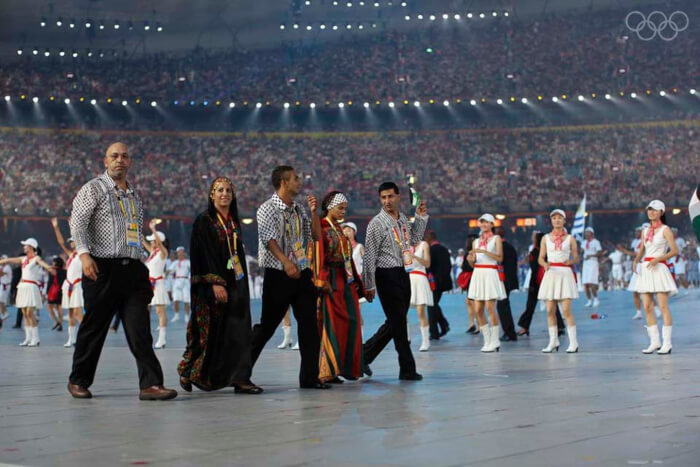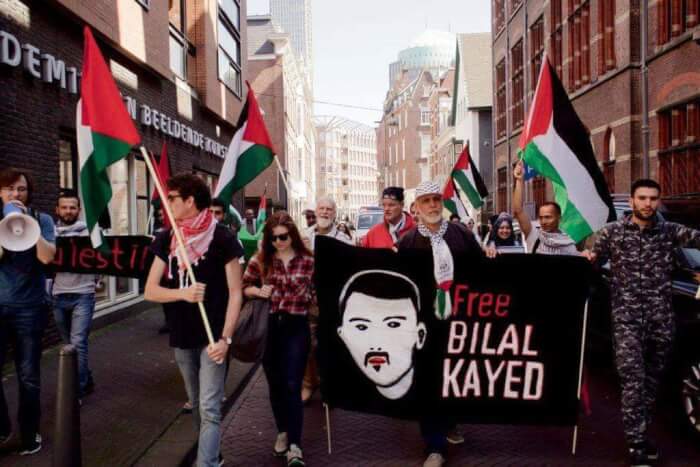President Obama hosted his annual Iftar dinner, a tradition at the White House originally started under the administration of former President Bill Clinton and organized by then First Lady Hillary Clinton. The guest list was inclusive and consisted of representatives of several American Muslim communities and also the diplomatic corp representing Islamic nations including those in the Middle East, such as Palestine, Jordan and Egypt.
By Ray Hanania
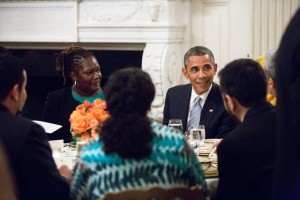
President Barack Obama welcomed Muslims at an Iftar signaling the break in the daily Fast during the Muslim Holy Month of Ramadan, a tradition at the White House started under former President Bill Clinton.
Obama welcomed the Muslim representatives from organizations from several major American cities and also representatives of the Diplomatic Corp from traditionally Islamic nations including countries from the Middle East such as Jordan, Iraq, Egypt and Palestine.
The president entered the mostly quiet room just a few minutes before 9 p.m. Salads were already served and being eaten by the 150 or so invited guests, members of Congress. Ramadan requires fasting until sunset and lasts from June 17 to July 17 this year, according to Google, according to a report issued by the national news media press pool.
Also in attendance were Illinois Senator Dick Durbin, who has been very supportive of Middle East peace, and has been a champion of diversity and confronting bigotry, as was Muslim Congressman Keith Ellison.
The Press Pool Reporter continued, “You don’t have to all be this serious,” Obama said. “You know these are the longest days of the year which is why I’m glad they put down the first course right away.”
Obama said he wanted to recognize inspiring young people, “many of whom I put at my table.” He called Ramadan a time when Muslims recommit themselves to their faith.
“The Koran teaches us that God’s children tread gently on the earth … We affirm that whatever our faith, we are one family.”
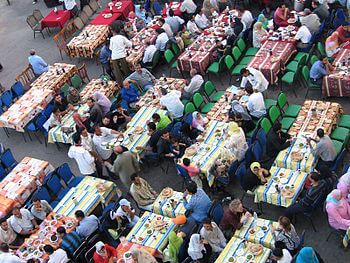
Obama mentioned Samantha Elauf, who was sitting at his table, who recently won a Supreme Court case against Abercrombie & Fitch because the company initially wouldn’t let her wear a hijab to work. Obama mentioned he had not spoken before the high court at her age. He also feted (Minnesotan) Munira Khalif, a teenager who just graduated high school, who has spoken in front of the United Nations about women being counted in a census and was accepted to all Ivy League schools. She chose Harvard. Obama said at 18 he also had not spoken in front of a UN panel.
Obama also mentioned Charleston: “Our prayers remain in Charlestown … We insist that no one should be targeted for who they are … how they worship.”
He said we need to “stop yelling and start listening.” He mentioned the youngest guest at the dinner is a 16-year-old from New Jersey who started an advocacy organization there.
Obama noted Ramadan required challenge “sacrifice, discipline, patience.” He noted, “together we can overcome ignorance and prejudice.”
He said one of his heroes in the civil rights movement, John Lewis, always said you need to “use your feet” in these struggles.
The media Pool was escorted out of the meeting at about 9:10 p.m, before attendees began the second meal course. The Iftar was held in the East Room where roughly 150 invited guests began eating. The White House sent out some guests earlier.
The menu included: Vegetable salad with rosemary pita chips, lemon lamb, crushed peanut potatoes, French beans, chocolate flourless cake, cherry compote, chai tea, and yogurt sorbet.
For more information on Ramadan, click here.
The following is President Obama’s speech:
Welcome to the White House. Now, I know that these are the longest days of the year, which is why I’m so glad that they put the first course down right away. (Laughter.) I know you’re hungry, and I promise to be brief.
I want to thank the members of our diplomatic corps who are here today, as well as our members of Congress, and all those serving across government who are joining us. And I especially want to recognize all the inspiring young people who are here today, many of whom I’ve put at my table. To all of you, and to Muslim Americans across the country — Ramadan Kareem.
Our annual White House Iftar recognizes the sacredness of Ramadan to more than 1.5 billion Muslims around the world. It’s a time when Muslims recommit themselves to their faith, following days of discipline with nights of gratitude for the gifts that God bestows. It’s a time of spiritual renewal and a reminder of one’s duty to our fellow man — to serve one another and lift up the less fortunate. The Quran teaches that God’s children should tread gently upon the earth and, when confronted by ignorance, reply “peace.” In honoring these familiar values together — of peace and charity and forgiveness — we affirm that, whatever our faith, we’re all one family.
Our Iftar is also a reminder of the freedoms that bind us together as Americans, including the freedom of religion — that inviolable right to practice our faiths freely. That’s what Samantha Elauf represents. She was determined to defend the right to wear a hijab and to have the same opportunities as everybody else. She went all the way to the Supreme Court — which I didn’t do at her age. (Laughter.) And she won. (Applause.) So, Samantha, we’re very proud of you.
When our values are threatened, we come together as one nation. When three young Muslim Americans were brutally murdered in Chapel Hill earlier this year, Americans of all faiths rallied around that community. And obviously, tonight, our prayers remain with Charleston and Mother Emanuel church. As Americans, we insist that nobody should be targeted because of who they are, or what they look like, who they love, how they worship. We stand united against these hateful acts.
These are the freedoms and the ideals, and the values that we uphold. And it’s more important than ever, because around the world and here at home, there are those who seek to divide us by religion or race or sect. Here in America, many people personally don’t know someone who is Muslim. They mostly hear about Muslims in the news — and that can obviously lead to a very distorted impression.
We saw this play out recently at a mosque in Arizona. A group of protestors gathered outside with offensive signs against Islam and Muslims. And then the mosque’s leaders invited them inside to share in the evening prayer. One demonstrator, who accepted the invitation later, described how the experience changed him; how he finally saw the Muslim American community for what it is — peaceful and welcoming. That’s what can happen when we stop yelling and start listening. That’s why it’s so important always to lift up the stories and voices of proud Americans who are contributing to our country every day. And we have a lot of inspiring Americans here today.
They’re Muslim Americans like Ziad Ahmed. As a Bangladeshi-American growing up in New Jersey, he saw early on that there was not enough understanding in the world. So two years ago, he founded Redefy, a website to push back against harmful stereotypes by encouraging teens like him — he’s only 16; I think our youngest guest tonight — to share their stories. (Applause.) Because, in Ziad’s words, “ignorance can be defeated through education.” He wants to do his part to make sure that “Muslims can be equal members of society and still hold onto their faith and identity.” So we’re very proud of you, Ziad.
They’re Muslim Americans like Munira Khalif. And Munira is the daughter of Somali immigrants; she started an organization to support girls’ education in East Africa. She just graduated from high school in Minnesota, and she’s already lobbied Congress to pass the Girls Count Act so that girls in the developing world are documented at birth — a bill I was proud to sign into law last week. She’s even spoken at the United Nations. I was also not doing this at her age. (Laughter and applause.) This fall, Munira is heading to Harvard to continue her education in public service — which was a tough choice, because of course she was accepted to all the Ivy League schools she applied to. But we are very, very proud of you, and I know your community is as well.
They’re Muslim Americans like Batoul Abuharb, who was born in a refugee camp in Gaza, and when she was an infant her family moved to Houston. After graduating from Rice University, she spent a summer in Gaza working with the U.N. health clinic. After seeing people line up whenever new stocks of vaccines arrived, she started Dunia Health to improve the distribution of vaccines and tell families when to come in — all over text message. They’ve started with Palestinian refugees in Jordan, but the program has been so successful that the U.N. is looking to expand Dunia’s work to more countries across the Middle East. Batoul, we’re very proud of you. Congratulations. (Applause.)
So, Ziad, Munira, Batoul — they all talk about how much they value the opportunities they’ve had to succeed here in the United States. And they also remind us that our obligations to care for one another extend beyond our immediate communities, beyond our borders. So tonight, we keep in our prayers those who are suffering around the world, including those marking Ramadan in areas of conflict and deprivation and hunger. The people of Iraq and Syria as they push back on the barbarity of ISIL. The people of Yemen and Libya, who are seeking an end to ongoing violence and instability. Those fleeing war and hardship in boats across the Mediterranean. The people of Gaza, still recovering from last year’s conflict. The Rohingya in Myanmar, including migrants at sea, whose human rights must be upheld.
We’re proud, by the way, to have Wai Wai Nu with us tonight — a former political prisoner who’s working on human rights issues for the Rohingya and equal rights for women. So we’re glad to have you here with us tonight. (Applause.)
So these challenges around the world and here at home demand the very qualities you summon every day during Ramadan: sacrifice, discipline, patience. A resilience that says we don’t simply endure, but we overcome. Together, we can overcome ignorance and prejudice. Together, we will overcome conflict and injustice — not just with words, but with deeds. With what a hero of mine, the civil rights icon John Lewis, calls using our feet — getting out in the real world to organize and to create the change that we seek. That’s what so many of you do every single day. And that’s what we have to continue to do together, here in America and around the world. As the Quran teaches, let us answer with “Peace.”
May God bless you all. Have a wonderful Ramadan. And get back to dinner. (Laughter.) Thank you very much. (Applause.)
Expected Attendees at the White House Iftar Dinner
This evening, President Obama will continue a White House tradition by hosting an Iftar in observance of the Muslim holy month of Ramadan in the East Room. This is the seventh Iftar, the traditional breaking of the fast at sunset, hosted by the President. This year’s dinner will have a special focus on young leaders and women, some of whom will be seated at the President’s table this evening.
Below is a list of some of the expected attendees at tonight’s White House dinner recognizing Ramadan:
Guests Seated at the President’s Table:
· Ms. Batoul Abuharb, Houston, TX
· Mr. Ziad Ahmed, Princeton, NJ
· Ms. Samantha Elauf, Tulsa, OK
· Ms. Munira Khalif, Fridley, MN
· Ms. Kadra Mohamed, Saint Paul, MN
· Ms. Riham Osman, Houston, TX
· Mr. Wayne Rucker, Philadelphia, PA
· Ms. Wai Wai Nu, Rangoon, Burma
Members of Congress:
· The Honorable Andre Carson, United States Representative, Indiana
· The Honorable Richard Durbin, United States Senator, Illinois
· The Honorable Keith Ellison, United States Representative, Minnesota
Diplomatic Corps:
· His Excellency Michael Moussa Adamo, Ambassador of the Gabonese Republic
· His Excellency Lukman Al Faily, Ambassador of the Republic of Iraq
· Her Excellency Hunaina Al Mughairy, Ambassador of the Sultanate of Oman
· His Excellency Yousif Mana Saeed Al Otaiba, Ambassador of the United Arab Emirates
· Mr. Sami Alsadhan, Deputy Chief of Mission and Charge d’Affaires a.i., Embassy of Saudi Arabia (Guest of His Excellency Adel Ahmed Al-Jubeir)
· His Excellency Sheikh Salem Al-Sabah, Ambassador of the State of Kuwait
· Her Excellency Hassana Alidou, Ambassador of the Republic of Niger
· His Excellency Abudlla Mohamed Alkhalifa, Ambassador of the Kingdom of Bahrain
· Mr. Adel Ali Ahmed Alsunaini, Charge d’Affaires a.i., Embassy of Yemen
· Chief Representative Maen Areikat, PLO Delegation to the United States
· His Excellency Madjid Bouguerra, Ambassador of People’s Democratic Republic of Algeria
· His Excellency Rachad Bouhlal, Ambassador of the Kingdom of Morocco
· Her Excellency Alia Bouran, Ambassador of the Hashemite Kingdom of Jordan
· His Excellency Budi Bowoleksono, Ambassador of the Republic of Indonesia
· Her Excellency Wafa Bughaighis, Charge d’Affaires, Embassy of Libya
· His Excellency Antoine Chedid, Ambassador of the Lebanese Republic
· His Excellency Tiena Coulibaly, Ambassador of the Republic of Mali
· His Excellency Daouda Diabate, Ambassador of the Republic of Cote d’Ivoire
· His Excellency Mohamed El Haycen, Ambassador of the Islamic Republic of Mauritania
· Her Excellency Floreta Faber, Ambassador of the Republic of Albania
· The Honorable Sheikh Faye, Ambassador of the Republic of The Gambia
· His Excellency Ufuk Gokcen, Ambassador and Permanent Observer of the Organization of the Islamic Cooperation to the United Nations
· His Excellency Faycal Gouia, Ambassador of the Republic of Tunisia
· His Excellency Bakhtiyar Gulyamov, Ambassador of the Republic of Uzbekistan
· His Excellency Mahamat Hassane, Ambassador of the Republic of Chad
· His Excellency Awang Adek Bin Hussin, Ambassador of Malaysia
· His Excellency Akan Ismaili, Ambassador of the Republic of Kosovo
· His Excellency Jalil Abbas Jilani, Ambassador of the Islamic Republic of Pakistan
· His Excellency Serdar Kilic, Ambassador of the Republic of Turkey
· His Excellency Subhas Mungra, Ambassador of the Republic of Suriname
· Her Excellency Jadranka Negodic, Ambassador of Bosnia and Herzegovina
· His Excellency Meret Orazov, Ambassador of Turkmenistan
· His Excellency Farhod Salim, Ambassador of the Republic of Tajikistan
· His Excellency Ahmed Sareer, Ambassador of the Republic of Maldives
· Mr. Seydou Sinka, Charge d’Affaires a.i., Embassy of Burkina Faso
· His Excellency Bockari Stevens, Ambassador of the Republic of Sierra Leone
· His Excellency Elin Emin Oglu Suleymanov, Ambassador of the Republic of Azerbaijan


- Israelisnipers shooting and killing hospital workers in Gaza - December 11, 2023
- CAIR Condemns Israeli Executions of Wounded, Unarmed Palestinian in West Bank - December 11, 2023
- Arab and Muslim American voters face a “simple choice” between Biden’s inhumanity and Trump’s edgy politics - December 9, 2023













